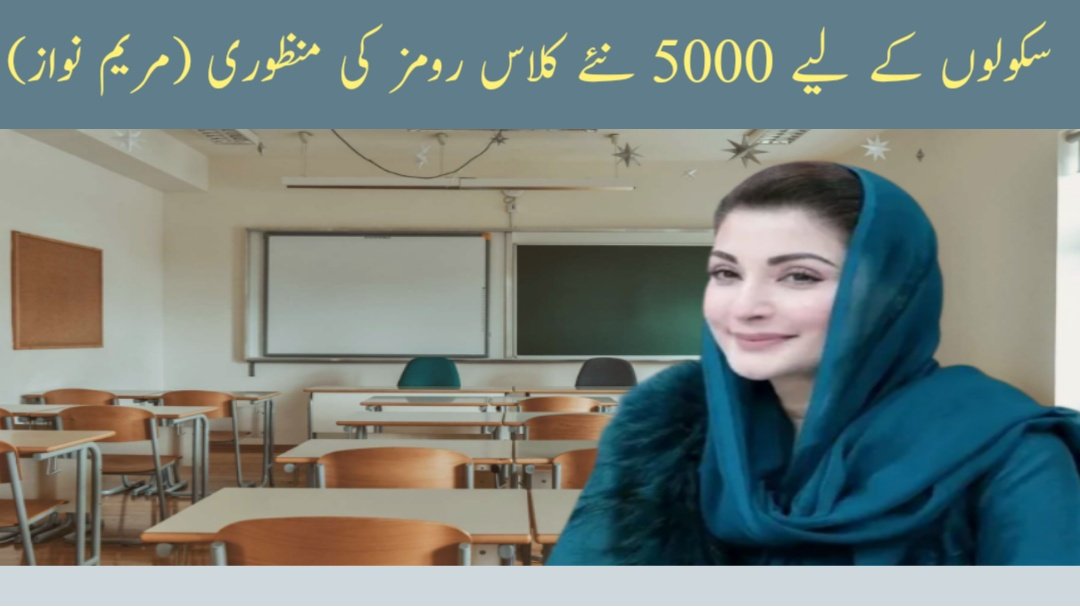A significant initiative to enhance education in the state has been unveiled by Maryam Nawaz, the chief minister of Punjab. She presented her plan to modernise government schools at a high-level gathering in Lahore. This entails constructing 5,000 additional classrooms, establishing cutting-edge laboratories, and putting laws into place to guarantee high-quality instruction. By filling in the gaps in infrastructure, facilities, and resources, these actions seek to raise government schools to the level of private ones
| Key Highlights | Details |
| New Classrooms Planned | 5,000 |
| Focus Areas | Infrastructure, Labs, Student Competitions |
| Teachers Regularized | 14,000 Assistant Education Officers |
| Environmental Focus | Green School Programme |
5,000 New Classrooms and Infrastructure Upgrades
Maryam Nawaz underlined how critical it is to upgrade educational facilities. 5,000 new classrooms will be built throughout Punjab as part of the proposal. These classrooms will improve the learning environment and help accommodate more students. The government has begun mapping current schools to find and fix infrastructural gaps in order to guarantee that every school satisfies quality criteria. This action guarantees that remote schools receive the same funding and attention.

Green School Programme
During the discussion, a novel project called the Green School Programme was introduced. Students’ understanding of environmental issues is the goal of this curriculum. Every student will plant a minimum of one tree as part of this strategy, and the progress will be monitored online. This initiative helps create a greener Punjab in addition to teaching pupils about environmental responsibility. By fusing sustainability and education, the project empowers children to take an active role in protecting the environment.
Improvements for Teachers and Staff
The regularisation of 14,000 secondary school teachers and assistant education officers is a major step. Teachers now have job stability and incentive thanks to this decision. Delivering high-quality education requires motivated instructors, and this action demonstrates the government’s dedication to helping educators. Plans are also in motion to provide teachers with training in contemporary teaching techniques, which will improve their abilities and the results of their classes.
Nutrition and Health for Better Performance
Another pilot project that was discussed during the meeting was the Punjab School Nutrition Programme. This program, which is scheduled to begin in the districts of Rajanpur, Layyah, and Bhakkar, intends to give students nutritious meals. Eating well is crucial for increasing concentration and academic achievement. The government is guaranteeing that students may focus more effectively on their studies by attending to this requirement, which will ultimately result in improved outcomes.
Competitions and Character Building
In order to improve student engagement, Maryam Nawaz instructed schools to hold weekly and monthly competitions. These activities will boost extracurricular and academic performance, promoting students’ overall development. Additionally, the introduction of spoken English and character-building classes will improve students’ communication skills and moral values, ensuring that students are ready for both academic success and personal development.
Benefits of the 5,000 New Classrooms
5,000 additional classrooms are being built in order to accommodate more pupils. introduction of cutting-edge laboratories for hands-on education. 14,000 instructors will be regularised, guaranteeing work security. The Green School Program raises awareness of environmental issues. monthly and weekly contests to increase participation in extracurricular activities and academics. school-based nutrition programs that emphasise health.
Also Read More:Maryam Ki Dastak Program Extended to 10 New Districts Fresh Update
Conclusion
Maryam Nawaz’s approval of 5,000 new classrooms and other educational initiatives is a significant step forward for Punjab’s education system. The government’s commitment to fostering the next generation is reflected in the reforms, which include everything from infrastructure improvements to the introduction of academic and personal development programs to make government schools competitive with private ones.
